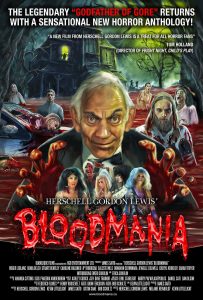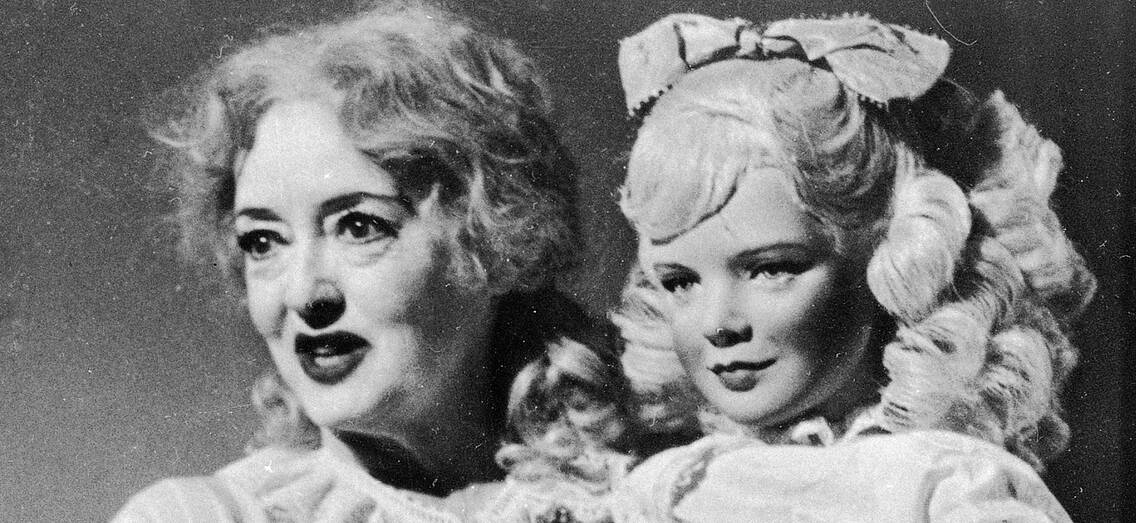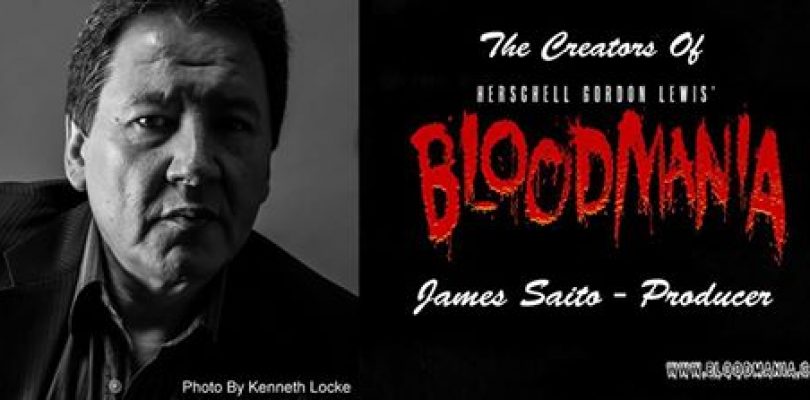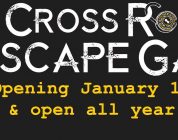It is safe to say that without Herschell Gordon Lewis, the splatter horror subgenre would probably not have existed in the manner that it has taken shape. That means no Dawn of the Dead, and no Braindead amongst others. Always business minded Lewis saw film as an opportunity to turn a profit. He asked questions in the vain of, What do the people want to see? and What films would make the most money? And although he is known as the “Godfather of Gore” for his ludicrously bloody and exploitatively entertaining horror films– with titles such as The Wizard of Gore, The Gore Gore Girls and Color Me Blood Red— Mr. Lewis, is quite a successful writer in the field of advertising and marketing, hence, it should come to no surprise that Lewis’ take on film is from a financial standpoint.

Starting out with nudie films, until that market faded into obscurity, Lewis sought to give the masses what they didn’t know they desired: blood, and lots of it. His first feature, Blood Feast (1963), is a macabre tale about a murderous Egyptian who kills women in order to give life to a dormant Egyptian goddess, and features gruesome, bloody deaths, and mutilations unlike anything seen before, in glorious color! Lewis’ films, with their macabre nature, captured it’s horrendous and devilishly gleeful mutilations with illuminating conviction.
His films have a guerilla style to them, made under swift conditions with the utmost frugality, for the purpose of instant gratification. This is something that Lewis was aware and attuned with– the idea of a postmodern culture that needs and wants its pleasure, now, serving the masses what they most desire, whether it was sex or violence. Lewis makes a buck and the audience revels in the product, in turn, greasing the gears of the money machine, so the filmmaker can churn out newer products. However, this shouldn’t be confused for callous capitalism, there is enough in these films that is in tune with what fans of the genre love and expect and will undoubtedly appreciate. Independent horror’s economics are more comparable to a small business– a community of individuals helping the smaller entities succeed.
I had a chance to have a talk over the phone with James Saito, founder and president of HGB Entertainment (out of Calgary, Alberta, Canada) and producer of Mr. Lewis’ next project, the upcoming Bloodmania, an anthology film which features two episodes directed by Herschell Gordon Lewis himself. Bloodmania is produced alongside Diabolique Films, part of everything-horror mag Diabolique Magazine. Mr. Saito talked about the future of television, working with Herschell Gordon Lewis, and Quentin Tarantino (and plenty of other things), here is what he had to say:
WAIH: Tell us a little about yourself and HGB Entertainment.
 James Saito: HGB Entertainment is my production company based in Calgary, Alberta, Canada. We are the production end of
James Saito: HGB Entertainment is my production company based in Calgary, Alberta, Canada. We are the production end of
Diabolique Films, which in itself is a division of Diabolique Magazine— a genre magazine. We do all of our filming in Calgary, and planning to continue doing so. It’s a great place to film. Calgary, Alberta can be anywhere and anytime. If you’ve seen The Revenant you can understand the beauty of the area, which was shot all around here, same as Interstellar. We shoot Fargo the television series for FX. It’s a good place to film, we are opening up a major film studio here, this spring. It’s because of our weakened Canadian dollar, a lot of American films will be filming principal here.
WAIH: That’s great you guys get all the big stuff too.
JS: Yeah. I should say that, our visual effects guy on Herschell Gordon Lewis’ BloodMania, Mr. Dave Trainor is also the effects guru that works on Fargo and up into recently Hell on Wheels
WAIH: Whendid you start HGB?
JS: Three years ago I started the company. It’s amazing how time flies. That’s an interesting question because I hadn’t thought about it in quite some time.
 WAIH: Let’s talk about BloodMania. It’s an anthology film, right?
WAIH: Let’s talk about BloodMania. It’s an anthology film, right?
JS: Yes, it is. Four unique segments, individual from one another. The only common factor is that Mr. Lewis does act as the horror host. He also directed two of the segments and wrote one of them.
WAIH: You wrote one too, right?
JS:Yes. The inspiration for that was, I attended a Raven Banner screening, a film that Slash from Guns n Roses had produced, Nothing Left to Fear. There was a short film that had played before it. I remembered, ‘geez, I wasn’t too impressed with it’ and thought someone has to do better than that. And that evening– I’m prone to insomnia– I laid in bed thinking, what would be a great idea for a short story? The initial story came out. I couldn’t sleep, I started coming up with the action sequences in my mind, how they would rise and what order, hammered out a first draft the next day, in one sitting. It’s hard to say where inspiration comes from. If anyone should ever ask, where did this come from? Does this mean this? or Does this mean that? No, not really. I didn’t give it that much thought to it. It never occurred to me.
WAIH: How much experience do you have scriptwriting?
JS:First script! I did pitch a television series back in the 90s. A television series based on a rock n’ roll band and their misadventures. There was a Canadian Broadcast Corporation contest, if you were chosen they would produce a pilot. The problem was that the guidelines were so very strict: it has to take place in the 1800s in a rural community in Canada. It was, what we called a typical, CBC script. I majored in English, so mostly I write a series of essays that I publish online about various topics and humorous things. Writing has always been something that I enjoy doing, I have a zombie film review site.
But it’s not the first thing on my plates these days. I have many other things going on that I’m involved with. Simply trying to get Bloodmania into a condition where I can say to Greg Petaloudis at Diabolique, my partner: ‘it’s ready.’ This is for two reasons. Mr. Lewis has a considerable legacy, and it keeps me awake at night, worrying that I’m somehow going to “fuck that” somehow. That’s a primary concern, it keeps me on my toes, it’s also my first film produced by Diabolique Films and we want it to be as polished as we possibly can. I’m constantly working on developing future projects that sort of thing. Writing right now would be a luxury.

WAIH: Going back to what you were saying about working with Mr. Lewis I feel that’s pretty daunting considering, like you said, his legacy. And he’s still around making movies! What’s that like? What’s it like working with him? What’s he like?
JS: I was worried. Here is a horror icon– cult director. We sat down and began chatting about the project and I realized, he’s a very genuine warm man and more on the business side of filmmaking. He doesn’t look at it in any particular art form. He considers it a business. What are we going to do to make money from this film? When it comes down with working with Herschell and everything else: he almost drove one DP crazy because of his style. It’s very rare for Herschell to say, ‘let’s get a second take.’ In the editing room, it’s always fun, you’re forced to tell very linear stories. Do we have an insert to place here? No, we didn’t shoot any. What you end up with, I can in no way be disappointed, because you can tell right away that it’s Herschell Gordon Lewis and to try and affect that in any way it would be a disservice to his loyal and considerable fanbase. I have no interest in doing that. It was a great pleasure to work with him, he’s a very genuine man and very intelligent.
WAIH: I read a little bit about him and there was stuff I didn’t know. He is a very successful writer as well. He has published many books.
JSOh, many books on marketing. He’s been very helpful with helping out our marketing team, mostly with taglines and that kind of thing. When you get taglines from Herschell you’re almost going back to a different era. ‘We have a tale woven from the fabric of nightmares.’ Things like that, which are not commonly employed today, which were so effective for films of past generations. That’s very interesting. Like I was saying, he’s a great man. I recall one day sitting between takes, they were doing lighting setups and we were sitting there and he was telling me about his favorite poem and he recited a poem verbatim, and was so moved by this poem and he wept– the cameras I needed one. It would have been great to show the extraordinary depth of the man, very wise fellow. I know my life is better with my association with him.
WAIH: That’s really interesting, you don’t really get a hint of that through his movies. It’s really fascinating that someone like him, it seems, would go out and make these great splatter movies.
JS:Again, an eye for marketing, he saw an opportunity no one was doing; took an outlaw approach and nobody gets anywhere in this life without taking a few risks and he certainly turned this to a great advantage.
WAIH: I forgot to ask, this is going back to HGB, is there a mantra for the company, certain kind of films you want to make or capture a certain aura with your films?
JS:As the production arm of Diabolique, we are looking at primarily horror, which isn’t to say that I don’t want to go out and produce mainstream films. There are a couple of scripts that have come my way that I’m seeking investment for. One of them is a script written by one of my junior high school teachers, who wrote a novel and wrote the script himself. It involves the Huron Indians of North America and first encounter with the white man, it’s a bloody tale, not that we would film it as such. I would like to produce that and that would be what I like to call a ‘Canadian darling,’ that we would receive a large number of grants for. There’s that, but I’m not quite sure where we are going at this moment. It seems to me the future of horror lies in television. Films are very hard to sell these days and it’s getting harder and harder every time as things change, the way things are presented and everything else. It’s difficult especially for a young filmmaker. I’m fortunate enough to have Mr. Lewis and fortunate enough to have Diabolique, when you have distributors coming to you, instead of knocking on doors. It’s a nice feeling.
There’s a horror remake I wouldn’t mind tackling down the road for the big screen, it would be a remake of Whatever Happened to Baby Jane? Because I don’t think a modern audience has a clue about it, I think going in and totally revamping and re-imagining the script, it would play well on its own now, with minor modifications.

WAIH: I don’t think that one was has been touched since then.
JS:No and it wouldn’t be everybody’s traditional choice. But again I think it was done correctly. Also, we are looking at various avenues, I know HGB will be busy. We are planning on shooting a number of horror documentaries as well. Our first one will be about the Warner Brothers years, it’s almost completed now. We’re looking to do something along the line of the history of horror, including one-on-one interviews with people who have had a major influence in the horror genre.
WAIH: That’s great, I don’t think there are enough horror documentaries out there.
JS: Yeah, but we want to approach it differently as well. It would be delving into the life of the individual. We go in for eight hours with the camera and sit down and discuss, ‘What was your early life like? What were your hobbies? What were your interests?’ Then move into the filmmaking years to allow the people to know the person. The first one that we have in mind would be under the working title “Architect of Destiny” a one-on-one with Herschell Gordon Lewis. I’m very interested in doing that because I would like people to know the Herschell I know. Let’s face it, as this past week has clearly pointed out to us all [Note: the interview took place just a week or so after, David Bowie passed away], time waits for nobody. Mr. Lewis is getting up there.
WAIH: What are some of your influences in either film or literature. What do you seek or look for in a project?
JS:Film. I watched so much of of it in my time that I could probably go on for hours. [laughs] Early in my life, if we’re discussing the horror genre, I would have to look back at Universal to begin with. Later on, Hammer Films were a huge influence. Back in the drive-in era, going to something like Dr. Phibes or things like that. Directors, and that kind of thing, Kurosawa, Lynch, Tarantino— who I think is extremely adept at adapting other works into his own. But he does it with such flair and such class. So many films, and comedic-wise I could go back to the surrealism of the Marx Brothers, W.C. Fields. There’s been so many things that have influenced me over the years. Literary– Harlan Ellison, the great abstract humor author Tom Robbins, William Goldman, who pretty much taught me about the artistry in writing.
Everything that we experience goes into what we produce. I am fortunate in that there’s such a variety of things available to me over the course of my lifetime. It helps to be able to judge appropriately, what works and what doesn’t, what’s good and what’s not so good. Oh yeah, there’s the anthologies produced by Amicus studios in the late-60s and early-70s, direct inheritors to Hammer; a heavy on influence on the original Tales from the Crypt, Vault of Horror. They weren’t particularly bloody, but I trust the sensibility about them and the entertainment value as a model for Bloodmania

WAIH:Whencan we expect a release for “Bloodmania?”
JS: All I can say is, 2016. I’m negotiating with a number of studios. I have a figure in mind, Mr. Lewis has a figure in mind. Of course, once the deal is consummated its up to the distributor. It could be Halloween, but who knows. But it will be 2016, it was supposed to be 2015 but then again there’s always little hiccups and things like that. At one point, we actually had to do some reshooting. Although, the DP assured us ‘I think this lighting would be perfectly correct,’ in the end it ultimately wasn’t. You look at the old expression “We’ll fix it in post.,” and there is nothing you can do in post. If you try to brighten it up, you lose detail, it’s going digitized. That’s one thing that I would say to any young, independent filmmaker is: All the rules for film still apply. I was listening to a podcast saying, “Oh, these cameras are great you don’t have to worry about lighting, this and that.
WAIH: I’ve shot on both and I can tell you those rules still apply.
JS:Of course! The same rules apply! Yeah, we went back in and it wasn’t a great deal of money and we had fun doing it, which is the important thing. It was one Mr. Lewis had directed so I went in and directed the re-shoots. Which wasn’t really directing because it was shot-for-shot, action-for-action. The particular actors watched what had been shot previously and basically recreated with better lighting and it made all the difference in the world. We are almost at a point right now, where we are at a complete and utter lock. Just waiting on a few pieces of the musical score.
WAIH: Either way I can’t wait!
JS:I think you’ll enjoy it. I’m a horror fan that wanted to make a movie for horror fans. I look at my own particular tastes. We recently held a test screening for some really hardcore horror fans. These are the people that live and breathe horror and with much trepidation I took all the comment sheets and sat down and started tabulating the answers and apart from a few little things, there was nothing bad said about the film. The comments were overall very good. There was nothing that they suggested we should change, there was nothing like that. It’s been a long journey, it’s been a couple of years now, almost three, from conception to laying in these last musical tracks. I’ll be glad when I finally get it off my plate and move on and see where it goes from here.
But I do believe that HGB will be filming more for episodic television than more film down the road. Conceivably more than one, and then again, maybe not, I’m only one guy. If we manage what we are trying to accomplish right now then I would be showrunning something and trying to coordinate a film at the same time. But you will be seeing more from Diabolique Films, whether or not, it’s a film or a television series or… I also plan to start a podcast sometime this year, when I can find the time. We’ve got the space, we’ve got the people, the celebrity guests, that would join us for a video podcast, it’s just a matter of finding the time.
WAIH: Sounds like you’re keeping busy.
JS:I try to.
Thank you so much for taking the time out of your incredibly busy schedule, James Saito, to sit and chat with We Are Indie Horror.
Be sure to watch the trailer and follow all the important links below for all the latest information on Bloodmania


